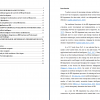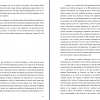Тема: Artificial Intelligence in HR: Transformation of HR Functions and Future Development of the HR Sphere
Закажите новую по вашим требованиям
Представленный материал является образцом учебного исследования, примером структуры и содержания учебного исследования по заявленной теме. Размещён исключительно в информационных и ознакомительных целях.
Workspay.ru оказывает информационные услуги по сбору, обработке и структурированию материалов в соответствии с требованиями заказчика.
Размещение материала не означает публикацию произведения впервые и не предполагает передачу исключительных авторских прав третьим лицам.
Материал не предназначен для дословной сдачи в образовательные организации и требует самостоятельной переработки с соблюдением законодательства Российской Федерации об авторском праве и принципов академической добросовестности.
Авторские права на исходные материалы принадлежат их законным правообладателям. В случае возникновения вопросов, связанных с размещённым материалом, просим направить обращение через форму обратной связи.
📋 Содержание
CHAPTER 1. EVOLUTION OF HR ROLES AND FUNCTIONS 8
1.1. An overview of traditional approaches and roles of HR professionals 8
1.2. Stages of HR function development 10
1.3. Digitalization: Technological transformations and new trends in HR practices 13
1.3.1. The concept of digitalization 13
1.3.2. New digital tools and platforms for various HR functions 15
1.3.3. Influence of digitalization on HR 16
CHAPTER 2. INTEGRATION OF ARTIFICIAL INTELLIGENCE INTO HR PRACTICES 18
2.1. The concept of artificial intelligence 18
2.2. Application of artificial intelligence-based solutions in HR function 21
2.3. Impact of Artificial Intelligence Integration on HR Functions and Professionals: Opportunities, Threats and Challenges 24
CHAPTER 3. EXPLORATORY RESEARCH: METHODOLOGY, PRELIMINARY RESULTS, AND IMPLICATIONS 28
1.1. Methodology 28
1.2. Results and Discussion 31
1.2.1. Analysis of international companies 31
1.2.2. Analysis of Russian companies 48
1.2.3. Comparative analysis: brief conclusions of the chapter 54
1.3. Theoretical and Practical implications 55
Conclusion 57
References 61
Appendix 69
📖 Введение
The traditional functions of the HR department include recruitment and performance evaluation, policy development and implementation, as well as strengthening productive relationships between the organization and its employees, etc. (Ercan Özen & Simon Grima, 2023). However, the HR department may soon move from its core administrative functions mentioned above to more creative and strategic functions through the introduction of new innovative technologies, such as artificial intelligence, which can radically affect millions of jobs around the world in various industries, changing the structure of the department and overall dynamics organizations (Aadesh Ashok Surve, 2020).
In a 2017 study from PwC, it was indicated that in international companies located mainly in the United States, but also in Asia and Europe, 40% of HR specialists use various applications based on artificial intelligence (PwC, 2017). Many companies have already started trying to use the trending technology of artificial intelligence in 2023 (Lucy Buchholz, 2023). And it was assumed that in the coming year more and more attention would be paid to this innovation and it would begin to be fully implemented into the existing processes not only of the HR department, but in principle throughout the company. Over time, the predicted results were noticeable, so the Society for Human Resource Management conducted a survey in 2024 (Dianna L. Stone et al., 2024), the results of which showed that currently 79% of large companies use artificial intelligence in their work with personnel, which will continue to make changes to the HR department processes: the training and recruitment system, evaluation of its effectiveness, etc. (Eti Jain et al., 2022).Artificial Intelligence, which is a technological trend of the 21st century, refers more to the concept that a system (or machine) is capable of performing a number of tasks that mainly necessitate human intelligence (the system imitates human intelligent actions) (IBM, n.d.; Francesca Rossi, 2016; David De Cremer & Garry Kasparov, 2021), which subsequently determines the future of HR.
As a rule, the HR department has always been considered very traditional and conservative in process automation and it seemed that it was lagging behind in digitalization efforts, but with the development of AI, the sphere has the opportunity to turn to something new and try to keep up with the times, simplifying some processes for itself. For example, artificial intelligence facilitates interaction between companies and potential candidates by providing introductory information or feedback, answering questions about the company, its organizational culture, etc., and helping to choose, for example, optimal benefit packages (Dianna L. Stone et al., 2024). There is also an AI that can identify employees who are inclined to leave the organization in advance, which helps the HR specialist to act proactively, drawing up employee retention strategies and increasing their involvement. This shows how quickly artificial intelligence responds to certain requests without spending a lot of time on repetitive administrative functions and simplifying them (Dianna L. Stone et al., 2024; PwC, 2017). Despite such a positive impact of integrating AI into everyday HR functions, there are still specialists who are unwilling to implement this innovative technology, as there are concerns that in some cases there is not enough data to provide an accurate analysis of a specific task, and that such decisions without empathy can lead to errors in judgment (Dianna L. Stone et al., 2024; PwC, 2017). But it's worth noting that, currently, there are a lot of companies in the human resources department of which artificial intelligence is already used in various processes to one degree or another, but what are the nuances of this process for the introduction of technology? What transformations are taking place?
While some see no problem with the adoption of AI and believe it offers significant benefits, the reality is that any technology will lead to significant transformations not only in the landscape of functions but, most importantly, in the structure of a department. There is a research gap in terms of limited comprehensive understanding of the specific transformations taking place in functions due to the emergence and gradual adoption of AI, and a lack of clarity on the long-term implications for employees, for example, in career trajectories, and specific changes in the HR department. These changes may include the obsolescence of some traditional roles in HR, the emergence of new functions and positions, and a general change in how HR contributes to the organization's strategy. Moreover, the need for upskilling HR professionals and ethical considerations to adapt to AI-integrated systems is under-explored. Understanding these dynamics is critical for companies around the world adopting this technology to cope with uncertainty and leverage the benefits of artificial intelligence. To maintain a competitive advantage, companies must navigate these changes, addressing potential workforce disruptions and ensuring that their established HR strategies are aligned with technological advances.
...
✅ Заключение
A pattern was revealed that both international and Russian companies from different industries use artificial intelligence in the HR department practice to optimize recruitment, employee development, and training processes, which helps to conduct initial interviews, analyze resumes and select candidates according to specified criteria, which can help HR specialists increase their experience working with candidates and, accordingly, efficiency. Moreover, generative AI is gaining popularity now, which, according to respondents, may soon be introduced into the HR department and used to perform real tasks, for example, compiling training materials, posts for a corporate blog, interview questions, generating pictures for an event or references for another department, etc., and not just for entertainment. In addition, although virtual assistants exist and have been used for a long time on almost any company website, specialists are beginning to implement, and some are already using, an advanced bot that not only answers questions from candidates and employees, which can significantly reduce the time for processing such requests by HR specialists, and for candidates and employees it is an excellent a way to quickly get the necessary information and documents. In addition, the widespread use in the future of services such as iCIMS Talent Cloud, JobVite, etc., offered by international HR specialists in the field of Human Capital Management (HCM), can also help automate various processes in the department, for example, the transformation of the personnel adaptation process or the preparation of job descriptions. Experts also believe that in the future, the focus will also be on a relatively forgotten digital identity management solution, which also uses AI and which is aimed at improving security.
Such attention to artificial intelligence and its use can lead to such functional transformations as the emergence of new functions against the background of the creation of new positions in the human resources department, for example, HR technologies and analysts who can participate in the implementation of AI and directly analyze data and metrics, specialists who will be responsible for the quality of the data provided and their compliance with the standards.Transformations in functions can often be identified due to the degree of implementation of AI, which in turn depends on the industry and the country in which the company operates. For example, in industries where technological orientation is valued and stimulated with a culture of continuous improvement and the introduction of new innovations and technologies, usually the logistics and transportation and mechanical engineering industries, AI is very actively discussed and implemented in the human resources department, since it also adheres to the company's culture. However, industries and countries with relatively low regulatory support and awareness of technology may implement such technologies a little slowly, understanding all the subtleties of this initiative, which may have a neutral effect on transformations in the field of HR specialists' functions, practically without changing anything in the structure, since AI will only be at the stage of consideration.
As for the important issue of the future of HR, which worried many, in the near future artificial intelligence will not be able to replace a human resources specialist and perform all his tasks, yes, there will be some structural changes, but the usual functions will remain, and AI, on the contrary, will take over only part of the work that is associated with administrative and repetitive tasks related to a large amount of data. The introduction of this technology into the HR department may entail a transformation of culture, which will now focus on continuous learning, which will be an important aspect in the effective integration of AI, which requires new skills, for example, in the form of data analysis. HR managers of Russian and international companies have come to the general conclusion that the main function will still be a people-oriented function, since empathy is required in such matters, for example, to make some exceptions for an employee who asked a question, given his merits and relationships with colleagues, that a machine would not be able to to do this, and made a decision on the request based on the algorithm embedded in it. However, it is worth noting, according to the forecast of an HR manager from an international company, significant transformations may occur in the next 15-20 years if artificial intelligence is used to improve it. Maybe there will be a breakthrough in strong and super AI, which will be able to take away even more functions and HR specialists.
...





